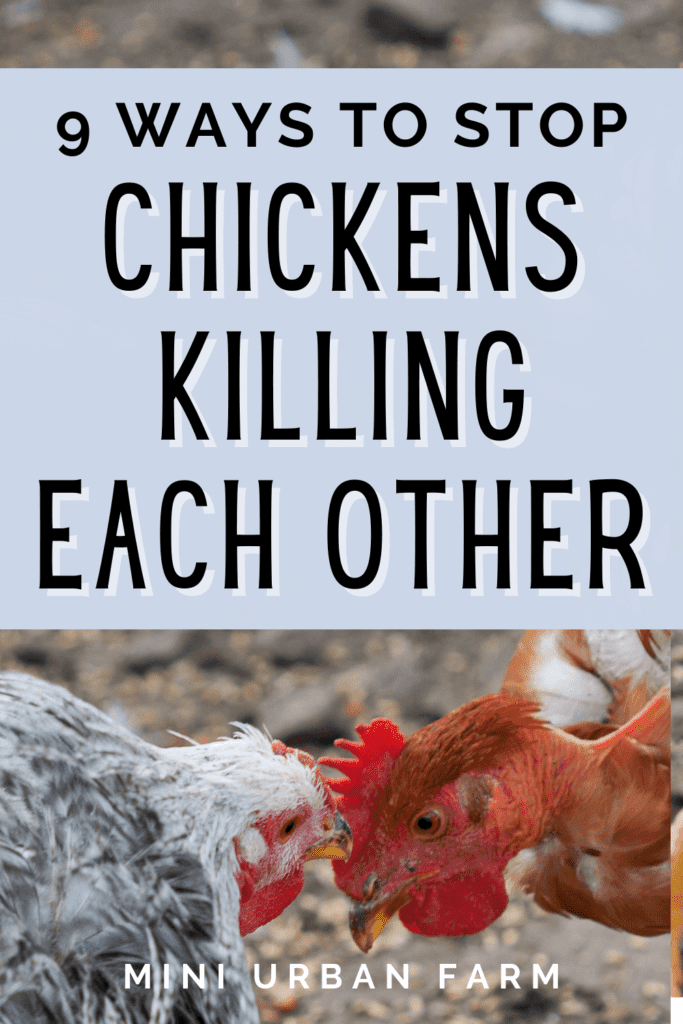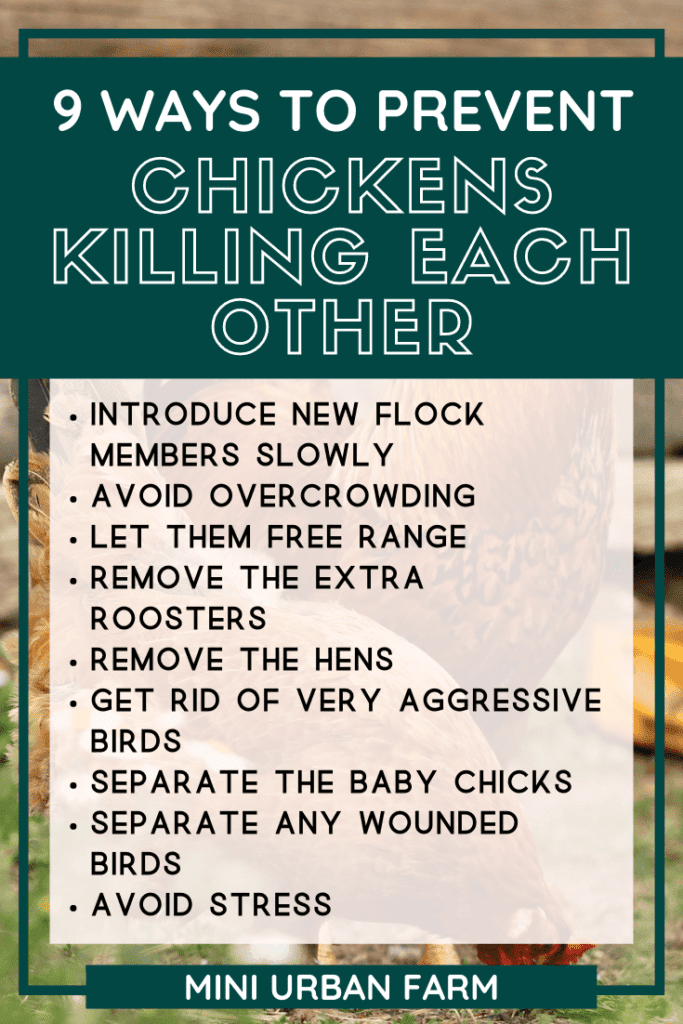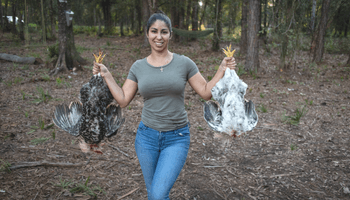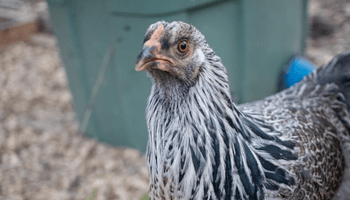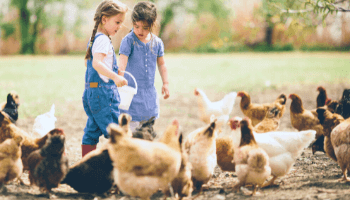We raise chickens for meat and eggs. And if you keep backyard chickens like we do then you know it’s not all peaches and roses when it comes to keeping your chickens safe. Between predators attacking your chickens and your chickens getting sick, there’s plenty to worry about. But who knew that your flock of cute little chickens would actually turn on each other! I had no idea this would be an issue when I first started raising backyard chickens. And as much as I hate that this happens, it’s a very real problem. So here are my absolute best ways to stop chickens from killing each other.
9 easy ways to stop chickens from killing each other:
- Introduce new flock members slowly
- Avoid overcrowding
- Let them free range
- Remove the extra roosters
- Remove the hens
- Get rid of very aggressive birds
- Separate the baby chicks
- Separate any wounded birds
- Avoid stress
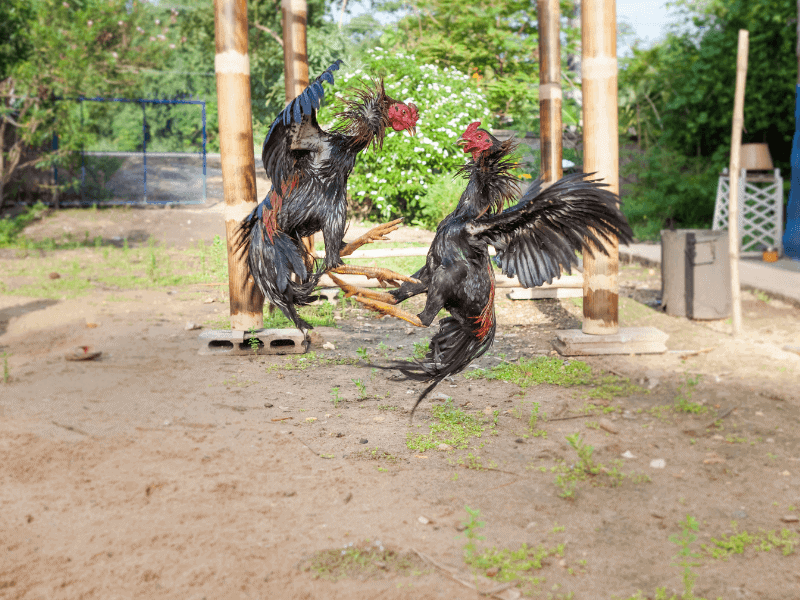
Disclosure: This post may contain affiliate links. If you purchase a product through one of our affiliate links we make a small commission from the sale at no extra cost to our readers.
9 EASY WAYS TO STOP CHICKENS FROM KILLING EACH OTHER
It wasn’t until we started raising chickens for meat that I noticed an issue.
We had about 20 chickens in our chicken tractor and I noticed that the males were fighting more than normal. And the females were getting severely wounded.
At first I thought that maybe something got into the pen, but after closer inspection it turns out that chickens can actually be very aggressive – and they will attack each other under the right conditions!
Of course, it’s not fun to go check on your flock only to find them hurt or no longer alive.
So by taking each of these points into careful consideration, hopefully you’ll be able to stop the chicken bullying altogether!
1. INTRODUCE NEW FLOCK MEMBERS SLOWLY
Pecking and bullying in chickens is a normal occurrence that establishes the pecking order – aka the chicken hierarchy system.
This is completely normal when a member of the flock feels threatened or wants to establish dominance. And this is especially true when new chickens are introduced to the flock.
It’s not cause for concern if your new flock member is being picked on. However, if you notice missing feathers, bleeding, or other signs of injury it might be time to separate the flock.
And when you are only introducing one new bird to a large flock it can be even worse!
Remember, this new chicken is at the bottom of the packing order for now, which means that all the other birds will be pecking at her to prevent the loss of their own status!
The best way to introduce new chickens to your flock is by allowing them to share the same space, but with a separator in place. Or by allowing them to free range at the same time, when the new bird can easily escape.
After a few times of doing that, try introducing the newest flock members, but be sure to keep an eye out for injuries!
2. AVOID OVERCROWDING
Overcrowding is one of the most common reasons that chickens attack each other.
Not only does overcrowding cause your flock to be stressed, which can lead to many other issues, but overcrowding literally puts your chickens in survival mode.
Of course, the more overcrowded they are (and the less resources there are) means that you are setting your flock up for injury!
Survival of the fittest is real in this situation, and the more dominant birds will try to get the weaker ones out of their way.
If this goes on for long periods of time, the weaker birds can be made to bleed. And as cute and cuddly as you think your chickens are, each of them is like a mini T-Rex – they can smell blood!
From there it’s only a matter of time before the other birds gang up on the injured chicken. And well, you can imagine the rest!
So in order to prevent this, make sure your birds have enough room in their coop and run. As well as enough food, water, nesting boxes, and perch space at all times!
3. LET THEM FREE RANGE
I like to imagine my flock as it’s own little family – there are the ones in charge, the ones that follow orders, and then sometimes you even have some baby chicks!
But just like any family, they need their space.
I mean, can you imagine being locked up in a coop with every member of your family 24/7?
I don’t know about you, but I get annoyed even being in the same house over the holidays!
And that’s why we stock up on wine!
But I digress….
Free ranging allows your chickens to have their space for a bit, burn off some energy, forage for whatever they want, and give them space to escape from the more aggressive chickens.
And I know that if you live in Suburbia like I do, that might not always be possible. But even allowing your flock into the backyard for a little while each day can work wonders!
Or if that’s not an option for you, make sure they have extra coop in their run so that they can get away from each other if need be.
4. REMOVE THE EXTRA ROOSTERS
Roosters fight for dominance over other roosters and hens. So naturally, keeping too many roosters together can be a recipe for disaster.
If you keep roosters at all, I’m pretty sure you’ll recognize this behavior. You know, hackle feathers all flared up, wings extended, weird noises coming out of their beaks.
I’ve even seen our roosters doing this to Mr. Mini Urban Farm!
They mostly do this to show their dominance. But it’s not just for show.
They are telling the other roosters that these hens are their hens. They are in charge of the flock. So back off.
You see, for every rooster you have, you should have the proper number of hens. And while the actual number varies, it’s usually anywhere from 7-10 hens per rooster.
Any less than that and the hens get “picked on” too much by the rooster. And if you have multiple roosters, they will fight for rights to mate with the hens – often leading to injuries and death.
Lots of people will also say to separate each rooster into his own flock and to keep them in separate pens.
And while this is probably the best way to do it, it’s usually not feasible if you are working with limited space.
We keep our two roosters in the same coop, but always make sure to have enough hens for the both of them. And it has prevented any issues so far!
5. REMOVE THE HENS
When we first got into raising chickens for meat, we kept noticing that our roosters were seriously injuring the hens on a consistent basis.
At that time we had more roosters than hens, and as you already know, this is not a great idea.
Not only were the roosters fighting for mating rights, but the hens were being overmated, causing a lot of damage!
This problem can be solved by removing the hens from your flock. Put them in a different coop or place a separator in your existing coop until butchering time if need be.
We did exactly that and immediately the problem was solved!
You see, without the hens, the roosters had way less motivation to show dominance, and were a lot calmer.
This started happening when the flock was about 4 months old, so from then on we separate our “almost ready to butcher” roos from the hens.
6. GET RID OF VERY AGGRESSIVE BIRDS
Most chickens are not inherently aggressive.
They do peck at each other, show dominance, and even injure each other from time to time. But generally, this is normal chicken behavior.
However, every once in a while you’re going to get a bad apple. This is true for all animals.
And the best thing you can do is to get rid of it.
Thankfully, this won’t happen often. But when you notice that one particular bird is overly aggressive and causing the majority of the issues, it’s time to go.
And basically you have two options in this case – rehome the culprit, or put him in a pot.
Personally, I choose the stock pot – for two reasons.
One, because I would never want another family to have an aggressive bird because of me.
And two, because “mean chicken” soup just tastes better 😛
7. SEPARATE THE BABY CHICKS
Normally I don’t let my hens go broody. When we hatch out our own eggs we tend to do them in the incubator since we get better results overall.
But we have had a few broody hens, and subsequently, issues with the chicks.
I’ve seen roosters attacking chicks that mama hen is trying to protect, other hens attacking unwanted chicks after hatching, and even baby chicks being attacked before they can get out of the egg!
Mostly, a mama hen will take care of her chicks after they hatch and defend them from other flock members.
But if you have a large flock, it can be very difficult for mama hen to protect them!
In this case, it’s better to separate the chicks – either with mama hen or without. This will ensure they are safe and get to the point where they can fend for themselves.
8. SEPARATE ANY WOUNDED BIRDS
Once a chicken has been wounded, you should separate it from the rest of the flock. This will prevent the bird from getting even more injured.
You see, while we think of chickens as cute little pets who give you breakfast, chickens are instinctually omnivores.
They eat seeds and grains, but they also eat insects, snakes, and mice.
And just like any other meat-eating animal, once they get a taste of blood they will not let up until the victim is no longer moving.
So to protect the injured bird from severe injuries and possible death, it’s best to keep him or her in solitary confinement until they get better.
But also remember, that when that bird is reintroduced to the flock, they will be treated like a brand new member since the pecking order has shifted in their absence. So be sure to keep an eye out for any new injuries!
9. AVOID STRESS
As you can see, there are a bunch of reasons why chickens kill each other. And a lot of this has to do with stress.
This can range from not enough lighting, to a lack of food, or even nearby predators!
When chickens get stressed out, they become cranky and aggressive.
Aggression leads to fighting, fighting leads to blood, and well here we are again.
So just like you won’t get any eggs if your chickens are stressed, you probably will have some behavioral issues to go along with it!
HOW DO I MAKE MY CHICKENS GET ALONG?
Unfortunately, you can’t just sit your chickens down for an intervention.
Your birds will peck on each other to establish the pecking order, to establish dominance, and to fight for resources.
So unless this behavior becomes constant and aggressive after fixing the issues listed above, it’s probably something you’ll have to learn to live with!
If you feel that one bird is particularly aggressive, it’s best to cut your losses before the situation gets worse. Just look at the silver lining – chicken soup makes great comfort food!
HOW TO TREAT CHICKEN WOUNDS
If your chicken has been injured, you can use the steps below to perform some basic chicken first aid:
- Separate the bird from the flock
- Swab the wound with clean gauze or towel to stop the bleeding
- Clean the area with hydrogen peroxide
- Apply a topical ointment like Neosporin or this Hen Healer ointment
- Keep the chicken away from the flock until it is completely healed
- Reintegrate the chicken with the flock and keep an eye out for other injuries
Unfortunately, chickens pecking each other is completely normal. But by using these 9 ways to stop chickens from killing each other listed above, you’ll be able to save your flock and prevent future issues!
pin ways to stop chickens from killing each other!
